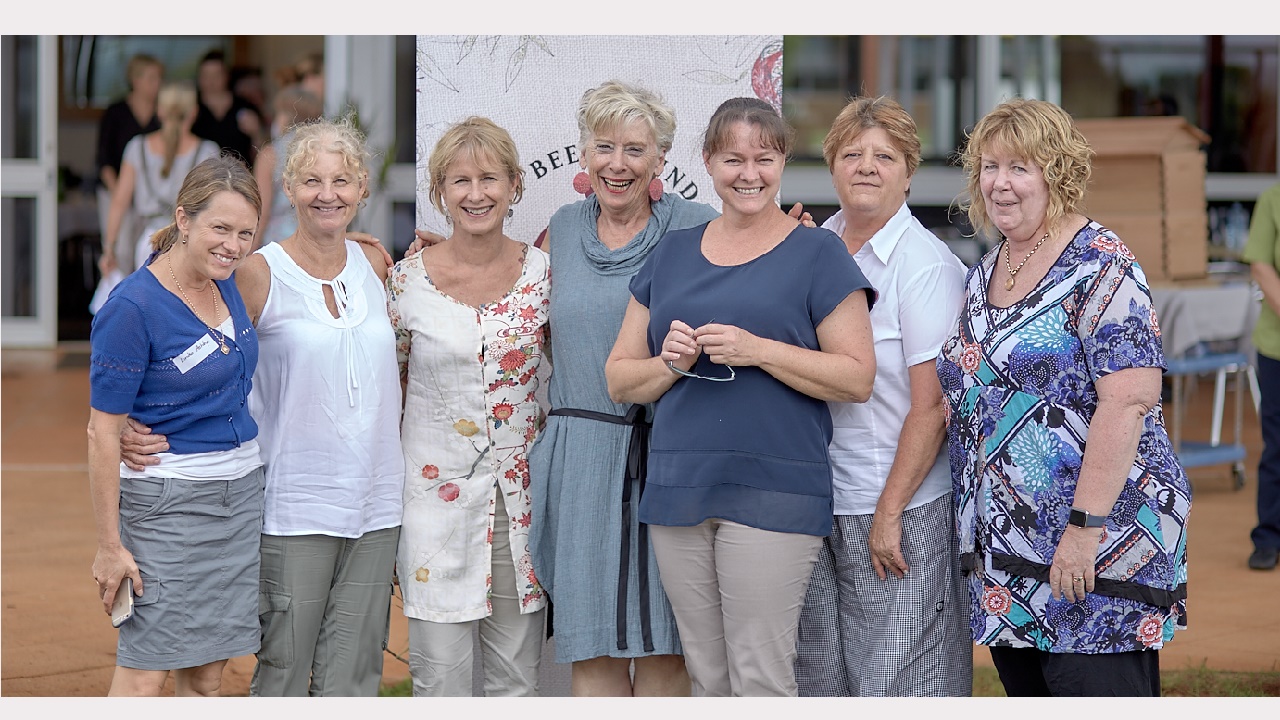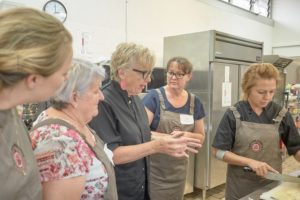Maggie Beer Foundation tour inspires chefs in residential aged care
Maggie Beer Foundation tour inspires chefs in residential aged care
by Heather Wiseman
Friday, April 28, 2017
Maggie Beer visited regional towns in northern NSW recently to promote the use of fresh food within residential aged care homes.
Maggie teamed with HammondCare executive chef Peter Morgan-Jones to deliver five workshops in Armidale, Grafton and Wollongbar to more than 90 staff cooks, chefs and managers.
In keeping with the Maggie Beer Foundation’s mission, the workshops aimed to inspire and support chefs to cook nutritious and flavoursome meals using fresh ingredients. The sector commonly serves food that is cooked, quick-chilled and then reheated.
During the workshops, Peter also discussed the meal-time needs of people living with dementia, strategies to make food look more appetising and food for people receiving palliative care.
Peter says people who cook in residential aged care are unsung heroes and those who go the extra mile to create fresh, tasty meals should be celebrated.
“Cooking in a residential care home is not deemed sexy and this needs to be turned around. Working in a care home kitchen is more stressful than cooking in a fine dining restaurant,” he says.
“It is a tough gig, with all of the documentation, regulations and dietary needs.
“People who are doing it well should be very proud.”
The workshops covered off with managers the need for an adequate food budget and the savings that flow from a reduced need for nutritional supplements. Chefs and cooks ended their day of training with a ‘mystery box’ cook-off, judged by Maggie and Peter.
One chef who attended the workshops, Scott Falls, works for Feros Care in Bangalow, where his team cooks for 64 high-need residents.
“To me, Maggie’s workshop highlighted that the stigma of cooking in aged care can be turned around,” says Scott.
“You can get so much satisfaction from the job, simply by providing food with a lot more taste and smells that can bring back memories of past good experiences.
“Maggie was also big on using fresh produce, especially herbs, and making sure that people on pureed diets have food with flavour and visual appeal.
“Just because people are at the end of their life doesn’t mean they don’t appreciate the taste of good food and the way it is presented on the plate.”
Since November last year, Scott has cooked texture-modified foods for residents on pureed diets. He cooks and purees vegetables before setting them in moulds so they take on the shape of vegetables again, which residents think is “pretty clever”.
“When it is heated properly it does look exactly like a spoon full of peas, or a wedge of roast pumpkin,” says Scott.
“We’re not just mashing it all together and putting gravy over it.”
Scott enjoyed Maggie’s emphasis on using fresh herbs and other tips to add flavour. He says he uses a lot of fresh garlic and basil in his tomato soup, and coats beef in mustard before roasting it. He uses a bread maker to create an appetising aroma in the dining room, knowing that the delicious smells will also be enjoyed by people who can’t eat solids.
One of the highlights of his work is hearing a little murmur of joy when he presents a 102-year-old resident with a meal.
“Every time you put a plate in front of him, he is just so happy,” says Scott, who encourages visiting family members to stay and enjoy a meal with residents.
When options on the menu don’t appeal to residents, he is happy to meet specific requests.
“Ten minutes out of your day to do something different for someone at the end of their life, so they can taste food or have a nice meal, is nothing. It’s really not too hard,” he says.
Feros Care hospitality manager Rick Stewart says overcoming the sector’s reliance on processed food is a challenge, so it is important for his chefs to be inspired by like-minded people who believe in serving fresh food.
“Peter and Maggie are banging the drum and our chefs feel inspired and proud to part of that movement,” he says.
“They come back with a twinkle in their eye and a spring in their step, inspired to try new things.”
For Rick, providing quality food is a powerful way of communicating to residents that they are valued.
“What is really important is that they feel heard and that they know they still matter,” he says.
“This is their home and they deserve to be treated with dignity.”
Maggie Beer is a keynote speaker at the Australian Palliative Care Conference in Adelaide on 6-8 September. The conference’s theme is Connection with Community.

